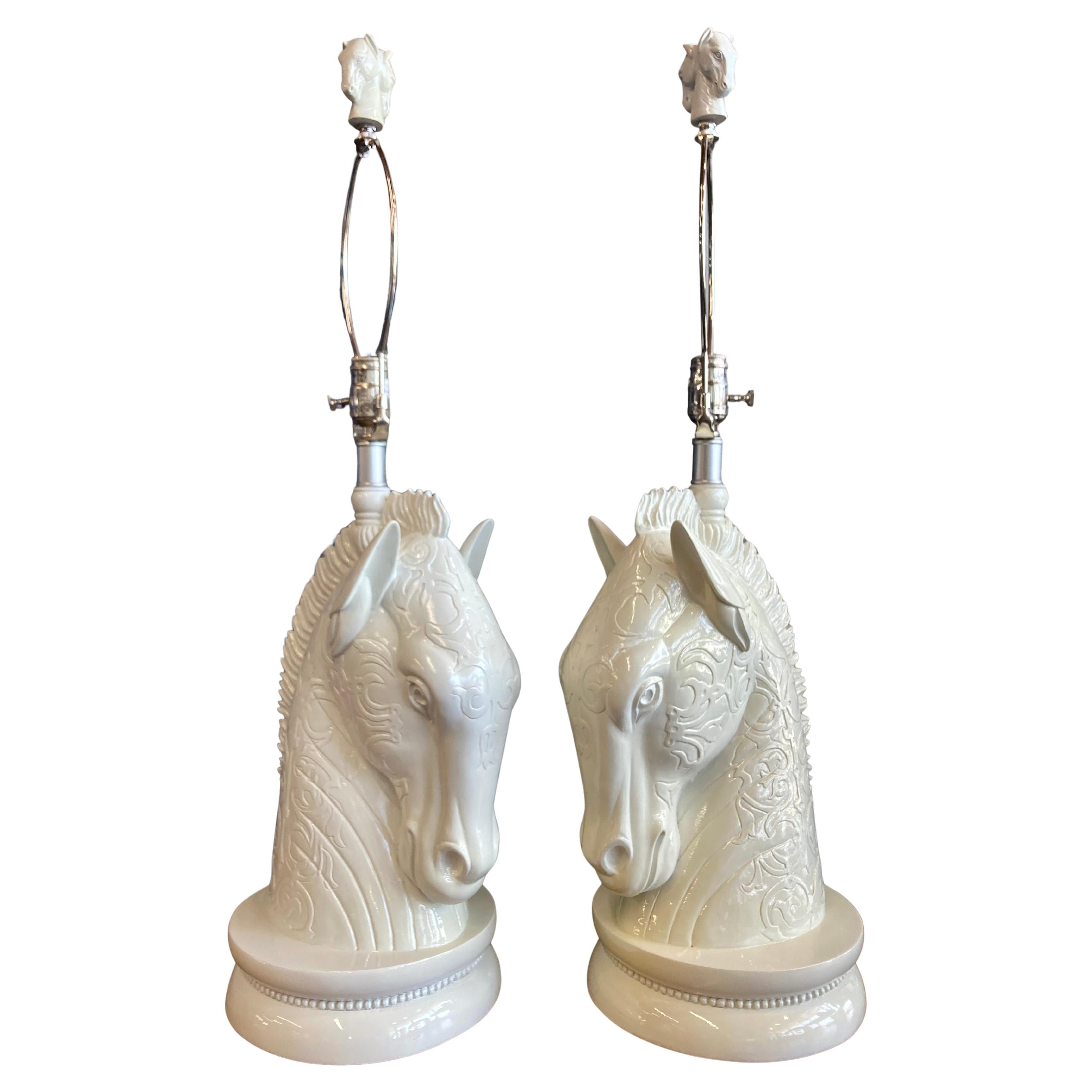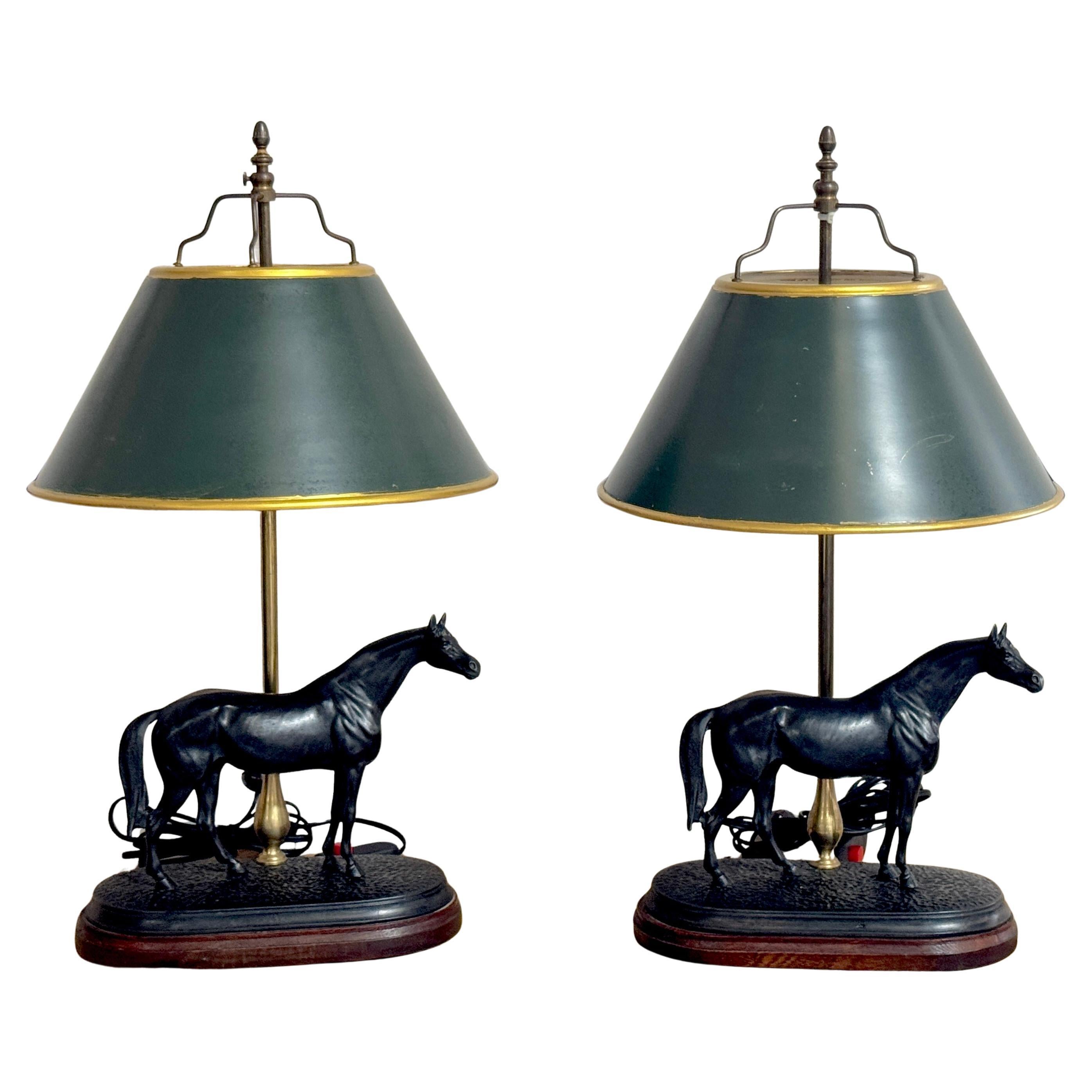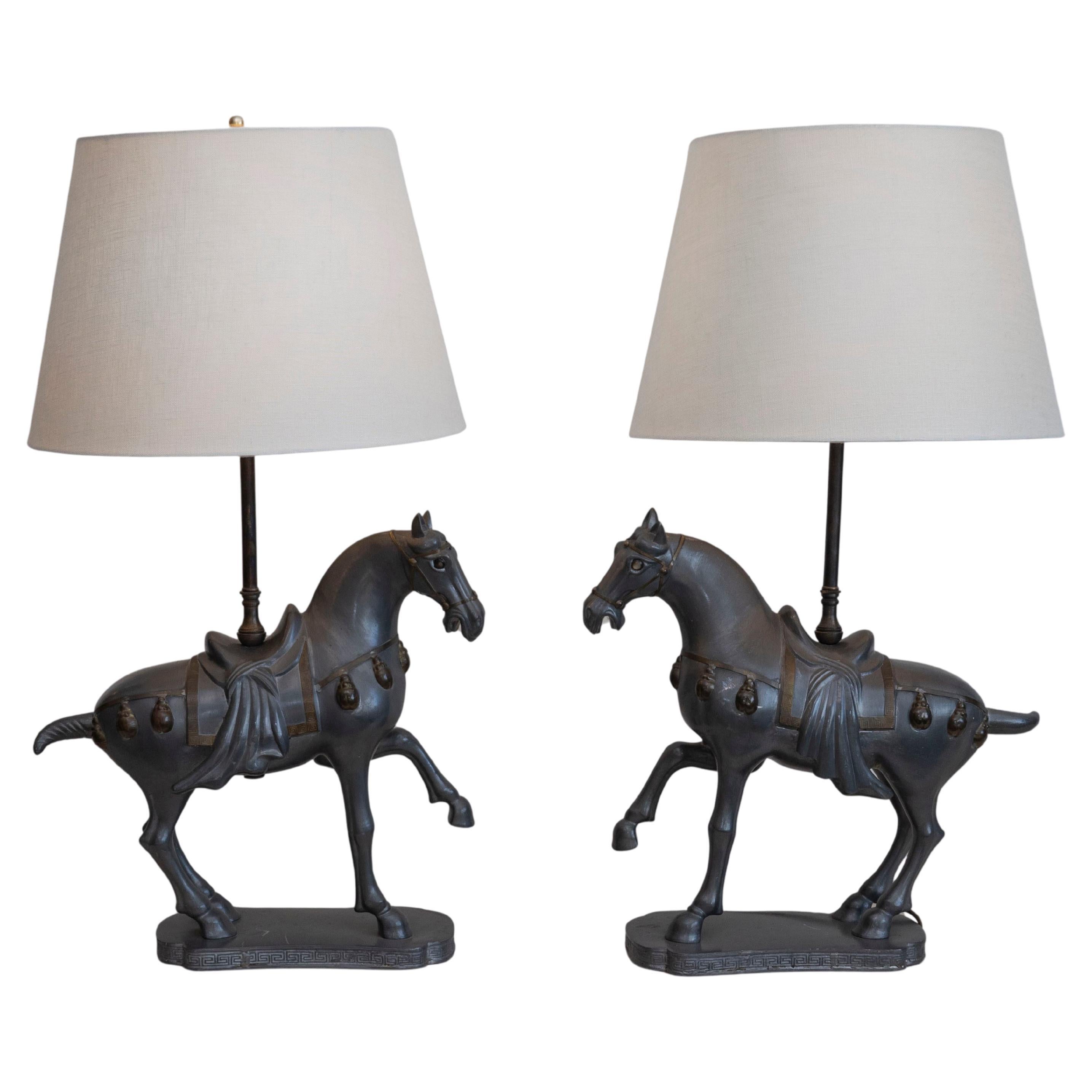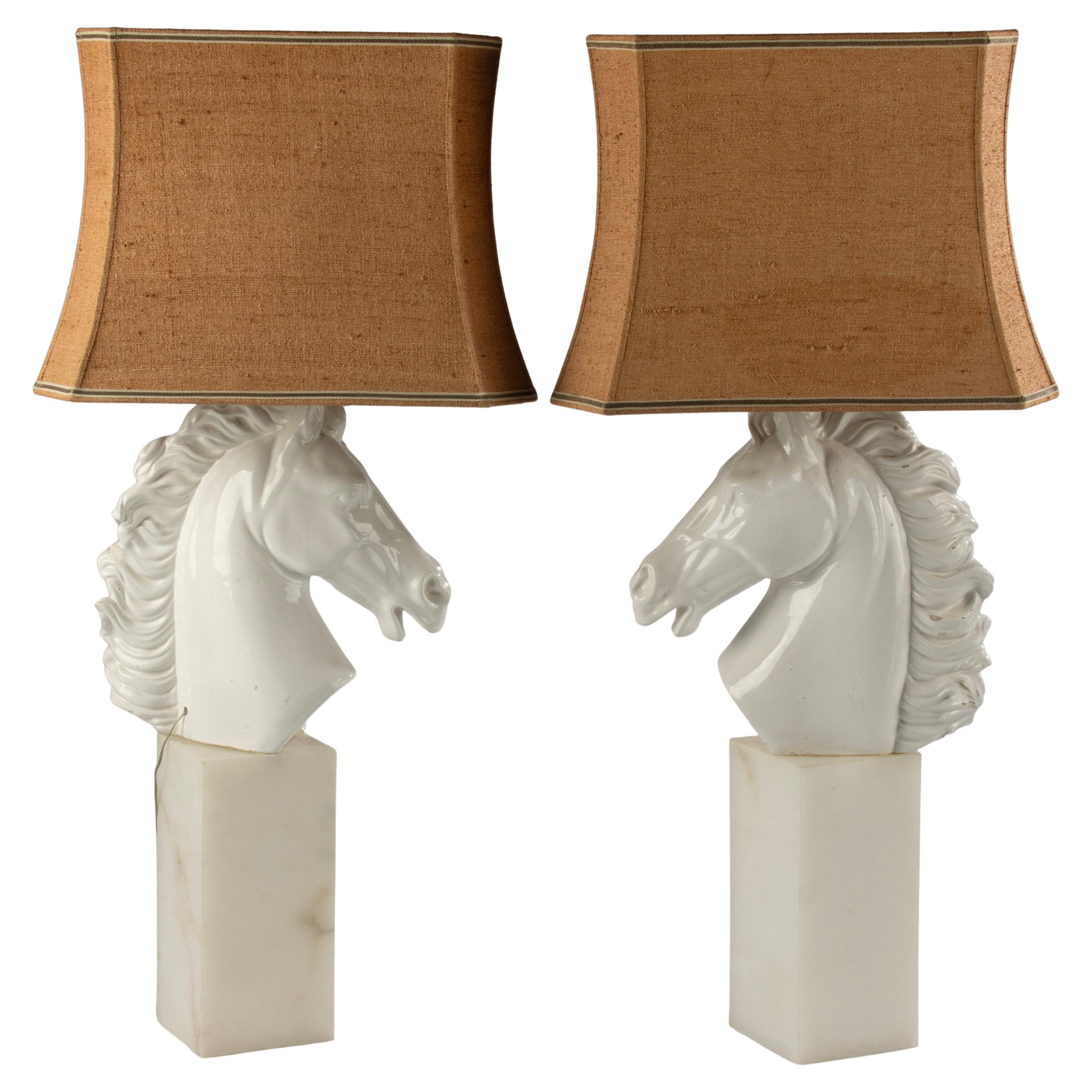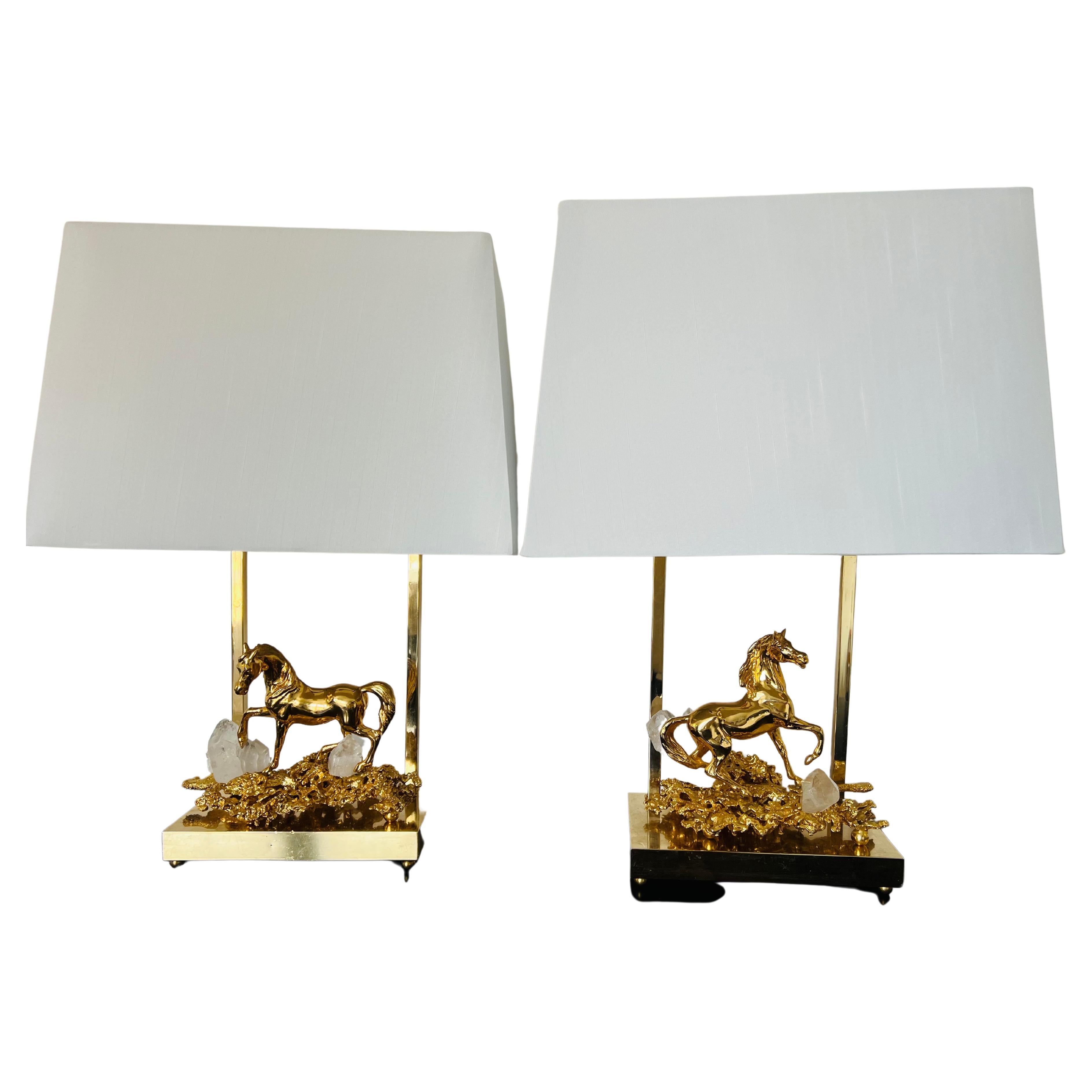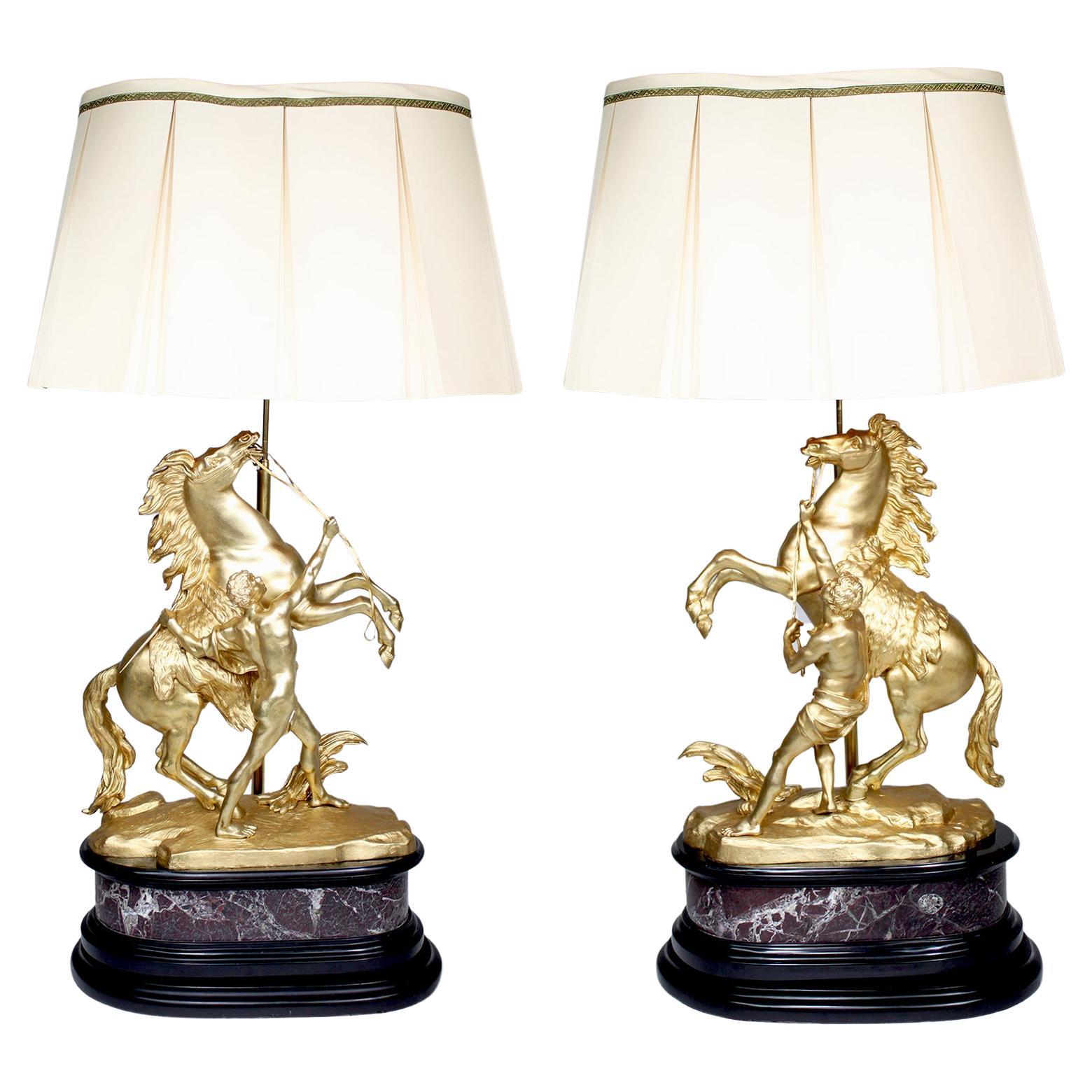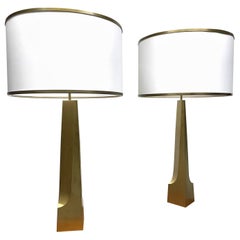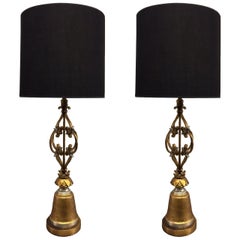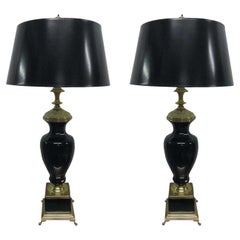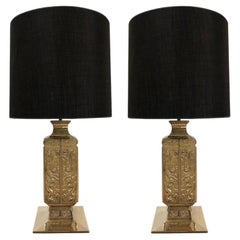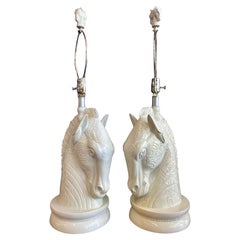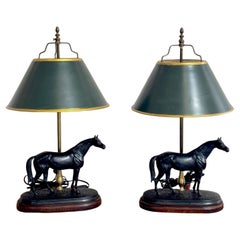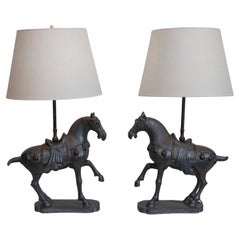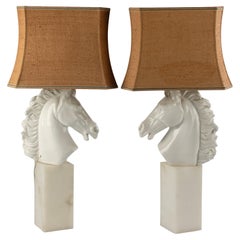Items Similar to Pair of French Bronze Horse Lamps Style of James Mont
Want more images or videos?
Request additional images or videos from the seller
1 of 6
Pair of French Bronze Horse Lamps Style of James Mont
$21,000per set
£15,942.84per set
€18,235.21per set
CA$29,340.05per set
A$32,632.53per set
CHF 17,039.70per set
MX$397,103.24per set
NOK 217,622.92per set
SEK 204,091.90per set
DKK 136,096.36per set
Shipping
Retrieving quote...The 1stDibs Promise:
Authenticity Guarantee,
Money-Back Guarantee,
24-Hour Cancellation
About the Item
Pair of French, bronze horse lamps. Has a solid black lacquered wood base. Lamps are heavy and each weighs roughly ten pounds.
Measures: 28.25 H (to top of finial) 8 D x 7 W
Shades not included.
- Dimensions:Height: 28.25 in (71.76 cm)Width: 7 in (17.78 cm)Depth: 8 in (20.32 cm)
- Sold As:Set of 2
- Style:Hollywood Regency (Of the Period)
- Materials and Techniques:
- Place of Origin:
- Period:
- Date of Manufacture:1950s
- Condition:
- Seller Location:New York, NY
- Reference Number:Seller: U58201stDibs: LU913721344532
About the Seller
4.9
Gold Seller
Premium sellers maintaining a 4.3+ rating and 24-hour response times
1stDibs seller since 2011
477 sales on 1stDibs
Typical response time: 1 hour
- ShippingRetrieving quote...Shipping from: New York, NY
- Return Policy
Authenticity Guarantee
In the unlikely event there’s an issue with an item’s authenticity, contact us within 1 year for a full refund. DetailsMoney-Back Guarantee
If your item is not as described, is damaged in transit, or does not arrive, contact us within 7 days for a full refund. Details24-Hour Cancellation
You have a 24-hour grace period in which to reconsider your purchase, with no questions asked.Vetted Professional Sellers
Our world-class sellers must adhere to strict standards for service and quality, maintaining the integrity of our listings.Price-Match Guarantee
If you find that a seller listed the same item for a lower price elsewhere, we’ll match it.Trusted Global Delivery
Our best-in-class carrier network provides specialized shipping options worldwide, including custom delivery.More From This Seller
View AllPair Large Solid Bronze Sculptural Lamps
Located in New York, NY
Pair of large solid bronze sculptural lamps. The shades have bronze trim.
Measures: 45.75H. Base: 5.25W x 5.25D.
Shades measures: 24 in diameter x 14.5 height.
Category
Vintage 1980s Modern Table Lamps
Materials
Bronze
$6,100 / set
Pair of Arturo Pani Style Wrought Iron Gold Leaf Lamps
By Arturo Pani
Located in New York, NY
Pair of Hollywood Regency wrought iron gold leaf lamps.
Measures: 44.5H (to top of finial). Under socket: 32 height, diameter: 8.5
Shades not included. Arturo Pani Style.
Category
Vintage 1950s French Neoclassical Table Lamps
Materials
Wrought Iron, Gold Leaf
Pair of Black Opaline and Brass Lamps
Located in New York, NY
Pair of black opaline and brass lamps. Has claw feet to the base.
Measures: 35.25" height (to top of finial) x 5.5" in diameter (at it's widest). Base:...
Category
Vintage 1950s Hollywood Regency Table Lamps
Materials
Opaline Glass
$7,200 / set
Bronze Asian Lamps Style of James Mont Pair
Located in New York, NY
Exquisite pair of bronze Asian lamps. These lamps are well designed, heavy and would look extra special in an Asian inspired room. James Mont styl...
Category
Vintage 1940s Chinese Export Table Lamps
Materials
Bronze
$14,000 / set
Pair of Chinese Polished Bronze Figural Lamps
Located in New York, NY
Pair of Chinese polished bronze figural lamps. Unique and very well designed.
Measures: 38.5 H (top of finial) under socket: 27 H. Base is 7 in di...
Category
Vintage 1950s Mid-Century Modern Table Lamps
Materials
Bronze
$12,000 / set
Pair of Regency Style Rosewood Finish Lamps
Located in New York, NY
Pair of Regency style faux rosewood finish lamps.
Measures: 35.25 H (top of finial).
Base: 5.5 diameter
Shades not included.
Category
Vintage 1940s Regency Table Lamps
Materials
Rosewood
$2,700 / set
You May Also Like
Vintage Horse Table Lamps, Pair of 2
Located in Alhambra, CA
Vintage pair of decorative lamps in the shape of proud horses with a geometric relief pattern. An excellent piece of Mid-Century Modern/Hollywood regency interior style. Each lamp is...
Category
Late 20th Century Hollywood Regency Table Lamps
Materials
Resin, Lacquer
$700 / set
Pair of French Bronze Horse Lamps With Tole Shades, After P.J. Mêne
By P.J. Mêne
Located in West Palm Beach, FL
Pair of French Bronze Horse Lamps With Tole Shades, After P.J. Mêne
A fine pair of French bronze horse lamps, exquisitely crafted after the renowned 19th-century sculptor Pierre-Jul...
Category
20th Century French Sporting Art Table Lamps
Materials
Metal, Bronze
20th Century Pair of Tang Dynasty-Style Horse Table Lamps
Located in Atlanta, GA
This striking pair of table lamps features elegantly sculpted horses inspired by Tang Dynasty-era equestrian statues, known for their regal posture and intricate detailing. The horse...
Category
20th Century French Tang Table Lamps
Materials
Resin
A Pair Large Italian Hollywood Regency Horse Head Table Lamps Marble and Ceramic
Located in Casteren, Noord-Brabant
A striking pair of large Italian Hollywood Regency table lamps featuring elegant white ceramic horse heads mounted on solid marble bases. Thes...
Category
Vintage 1970s Italian Hollywood Regency Table Lamps
Materials
Alabaster
$2,635 / set
Free Shipping
Pair of Horse Claude Victor Boeltz 1980 Gold Bronze Crystal French Table Lamps
By Claude Victor Boeltz
Located in New York, NY
A luxurious gold dore bronze and rock crystal horse table lamps. The gold bronze sculptures are on polished brass bases and they have complimentary ...
Category
Vintage 1980s French Post-Modern Table Lamps
Materials
Rock Crystal, Gold, Brass, Bronze
Pair French 19th/20th Century Gilt-Bronze Sculptures of The Marly Horses Lamps
By Guillaume Coustou
Located in Los Angeles, CA
A Fine Pair of French 19th/20th Century Gilt-Bronze Sculptures of "The Marly Horses" (Now turned into lamps) After the original by Guillaume Coustou (French, 1677-1746). The large pair of equestrian bronze sculptures, finished in a gold patina, each depicting rearing horses with their groom, both raised on oval a black slate and Bardiglio marble bases and fitted with modern electrical twin-light brass fittings and cream colored shades. The base on an ebonized wooden platform. Circa: Paris, 1900-1920.
Sculpture & Base Height: 31 1/4 inches (79.8 cm)
Base Width: 21 3/4 inches (55.3 cm)
Base Depth: 12 3/4 inches (32.4 cm)
Height to top of (Adjustable) shade fitting: 48 1/4 inches (122.6 cm)
Shade Height: 15 inches (38.1 cm)
Shade Width: 26 inches (66.1 cm)
Shade Depth: 20 inches (50.8 cm)
The original Marly Horses are two 1743–1745 Carrara marble sculpted groups by Guillaume Coustou. They were commissioned by Louis XV of France for the trough at the entrance to the grounds of his château de Marly. Coustou's last works, they were intended to replace two other sculpted groups, Mercury on Pegasus and Pegasus, Renown of Horses, both by Antoine Coysevox, which had been removed to the Tuileries Gardens in 1719.
Louis XV chose the modellos in 1743 and the full-size sculptures were completed in only two years, being installed at Marly in 1745. They proved highly successful in reproduction, particularly on a smaller scale, and prefigured Théodore Géricault and other Romantic artists' obsession with equestrian subjects. The Marly horses were later also used as the central motif of the monochrome 819-line RTF/ORTF test card which was used on TF1 from 1953 until 1983.
The originals were moved to the place de la Concorde in Paris in 1794 and Louis-Denis Caillouette (1790–1868) restored them in 1840. In 1984 it was concluded that the annual military parades on 14 July were damaging the sculptures and they were replaced by marble copies produced by Michel Bourbon in the studio of a subsidiary of Bouygues. The latter also gained the right to an extra copy, which was placed in Bouygues's social building. The original sculptures were moved to a former courtyard in the Richelieu wing of the Louvre Museum, which was renamed the 'cour Marly' in their honour, whilst Bourbon's two main copies were moved to the originals' first site near the trough at Marly, with work overseen by the architect Serge Macel.
Guillaume Coustou the Elder (29 November 1677, Lyon – 22 February 1746, Paris) was a French sculptor of the Baroque and Louis XIV style. He was a royal sculptor for Louis XIV and Louis XV and became Director of the Royal Academy of Painting and Sculpture in 1735. He is best known for his monumental statues of horses made for the Chateau of Marly, whose replicas now stand in the Place de la Concorde in Paris.
Coustou was a member of a family of famous sculptors; his uncle, Antoine Coysevox, was a royal sculptor; his elder brother, Nicolas Coustou was a sculptor, and his son Guillaume Coustou the Younger also become a noted royal sculptor. Like his older brother, he won the (Prix de Rome) of the Royal Academy which entitled him to study for four years at the French Academy in Rome. However, he refused to accept the discipline of the academy, gave up his studies, set out to make his own career as an artist. He worked for a time in the atelier of the painter Pierre Legros, and eventually returned to Paris.
Upon his return to Paris, he assisted his uncle Coysevox in making two monumental equestrian sculptures, Fame and Mercury, for the Château de Marly, the new residence of Louis XIV near the Palace of Versailles, where he went to escape the crowds and ceremony of the Palace. He later (1740–1745), made his own horses, The Horses of Marly, his most famous works, to replace them. The horses reinvent the theme of the colossal Roman marbles of the Horse Tamers in the Piazza Quirinale, Rome. They were commissioned by Louis XV in 1739 and installed in 1745 at the Abreuvoir ("Horse Trough") at Marly. The horses were considered masterpieces of the grace and expressiveness of the French Late Baroque or Rococo style. After the Revolution they were moved from Marly to the beginning of the Champs-Élysées on the Place de la Concorde. The originals were brought indoors for protection at the Louvre Museum in 1984.
In 1704 Coustou was received into the Académie royale de peinture et de sculpture. The work he made to mark his entrance was Hercules on the Pyre, now in the Louvre. It displays the special hallmark of the Baroque, a twisting and rising transverse pose, as well as highly skillful carving. He rose to become Director of the academy in 1733.
Another of his major works from his later career, the statue of Maria Leszczynska, (1731)is on display at the Louvre.
Coustou also created two colossal monuments, The Ocean and the Mediterranean among other sculptures for the park at Marly; the bronze Rhone, which formed part of the statue of Louis XIV at Lyons, and the sculptures at the entrance of the Hôtel des Invalides. Of these latter, the bas-relief representing Louis XIV mounted and accompanied by Justice and Prudence was destroyed during the Revolution, but was restored in 1815 by Pierre Cartellier from Coustou's model; the bronze figures of Mars and Minerva (1733–34), on either side of the doorway, were not interfered with.
In 1714 for Marly he collaborated in two marble sculptures representing Apollo Chasing Daphne (both at the Louvre), in which Nicolas Coustou sculpted the Apollo and Guillaume the Daphne. About the same time he was commissioned to produce another running figure in marble, a Hippomenes designed to complement an Atalanta copied from the Antique by Pierre Lepautre...
Category
Antique Early 1900s French Louis XV Animal Sculptures
Materials
Marble, Bronze
More Ways To Browse
Bronze Lamp Finials
Bronze Regency Lamp
Bronze Lamp Hollywood Regency
Horse Lamp
Horse Base Table
Vintage Horse Lamp
Horse Table Lamps
Lamps with Horses
Bronze Horse Table
Retro Horse Lamp
James Mont Style Lamps
Vintage Black Horse Lamp
Bronze Horse Lamp
James Mont Bronze
Bronze Horse Table Lamp
Cone Dining Table
Green Ceramic Lamps
Vintage Solid Glass Lamps
